| Srl | Item |
| 1 |
ID:
170823
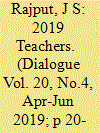

|
|
|
| 2 |
ID:
127766
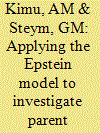

|
|
|
|
|
| Publication |
2013.
|
| Summary/Abstract |
Parent involvement in Kenya has mainly been limited to making financial contributions and serving on mandated school-parent bodies. Given the dire need to improve the quality of education, it is important to understand the role of parents in the provision of education. A qualitative research design explored the implementation of this model in primary schools in the Embu West District in Kenya. The findings revealed that limited parent involvement was a result of free primary education (FPE); the lack of a policy on parent involvement; the illiteracy of parents; parents' work commitments; lack of confidence in some parents; time constraints; the gendered nature of parent involvement; and the lack of parenting skills.
|
|
|
|
|
|
|
|
|
|
|
|
|
|
|
|
| 3 |
ID:
105266


|
|
|
| 4 |
ID:
106370
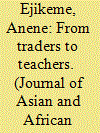

|
|
|
|
|
| Publication |
2011.
|
| Summary/Abstract |
In Onitsha, an important commercial center in Nigeria, success as a merchant was the usual route for women who aspired to elite status in the period before the 1930s. In 1928, a school for girls was opened by the Holy Rosary Sisters, a Catholic order created especially by the bishop in charge of Onitsha Diocese. The opening of this convent school in Onitsha heralded a major transformation in the lives of Onitsha women, marking the transition between two epochs with regard to how women achieved elite status. From the mid-1930s a new class of elite women began to appear in Onitsha, all products of mission education; this transition from traders to teachers marks a major shift in the lives and roles of elite women. The colonial government contributed to this transformation with policies that undermined women's ascendancy in the market by placing men in leadership positions there.
|
|
|
|
|
|
|
|
|
|
|
|
|
|
|
|
| 5 |
ID:
161642
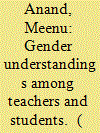

|
|
|
|
|
| Summary/Abstract |
Gender issues are of paramount interest in school education in India, but questions remain about what girls and boys actually learn about gender once they are in school. Are schools really places where teachers effectively combat traditional gender stereotypes among students? Relying on primary research in schools in Delhi, this article examines teachers’ biases and stereotypes regarding gender issues. Comparing this grassroots reality to the opinions on masculinity and femininity held by children in the same schools, the article identifies a need for more focused teacher education. The persistent gaps between tall claims about improved gender awareness, ambitious promises in policies and existing ground realities pose significant educational challenges for India, especially with regard to methods of promoting consciousness about gender-related issues in all domains of education.
|
|
|
|
|
|
|
|
|
|
|
|
|
|
|
|
| 6 |
ID:
096474
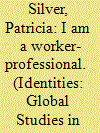

|
|
|
|
|
| Publication |
2010.
|
| Summary/Abstract |
This article examines economic and cultural capital in the lives of public school teachers in Puerto Rico across the last half of the twentieth century to examine the processes through which their class relations have formed and reformed with shifts in Puerto Rican political and economic conditions from the early days of United States rule through neoliberal school reforms of the 1990s. It traces the historical development of the "teacher class" as a female-identified, poorly paid, professional workforce, and examines the impact of class and gender ideologies in this process.
|
|
|
|
|
|
|
|
|
|
|
|
|
|
|
|
| 7 |
ID:
187065
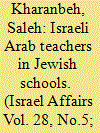

|
|
|
|
|
| Summary/Abstract |
Recently there has been a growing tendency among Israeli Arab teachers to work in Jewish schools. This trend has several sociopolitical and economic reasons but is generally viewed as a welcome development that should be encouraged. Based on interviews with ten Arab teachers in Jewish schools, this article seeks to delve into their living experience and understand their motivations and aspirations, as well as the obstacles they encounter. Its findings underscore two main obstacles that need to be surmounted: cultural differences and lower mastery of the Hebrew language, on the one hand, and the tension attending a different ethnic/national identity from that of the taught audience, on the other.
|
|
|
|
|
|
|
|
|
|
|
|
|
|
|
|
| 8 |
ID:
122843
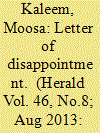

|
|
|
| 9 |
ID:
152806


|
|
|
|
|
| Summary/Abstract |
Sri Lanka is increasingly seeking to ensure that its public school system not only delivers greater shares of students who have completed higher secondary and tertiary education but also that all students obtain a much better education. Raising teacher effectiveness is considered to be crucial for achieving these aims. This article reviews the literature on teacher management in Sri Lanka and points to what may be critical teacher management issues. The article also discusses considerations and options for addressing these issues, informed by international evidence on approaches to improve teacher effectiveness.
|
|
|
|
|
|
|
|
|
|
|
|
|
|
|
|
| 10 |
ID:
191846
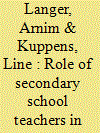

|
|
|
|
|
| Summary/Abstract |
Since Kenya's independence in 1963, ethnicity has been an important factor in Kenyan politics and everyday life. While recent research has shown that ethnic favouritism impacted the allocation of educational resources in the past, so far, no systematic research has been conducted on how teachers exacerbate, mitigate or countervail the political culture of ethnicity and ethnic favouritism. As agents of socialisation, teachers’ attitudes and behaviour can, consciously or unconsciously, convey the message that ethnic favouritism is normal and socially acceptable, or conversely delegitimise such practices. Based on a list experiment among 894 secondary school teachers in the county of Nairobi, we find that at least 25% of teachers have already favoured coethnic pupils. Interviews indicate that such favours are seldom blatant in nature and mainly serve to show solidarity with one's kin. Still, even small – frequently well-intentioned – favours may damage inter-group attitudes, trust and relations, and may even contribute to the persistence of ethnic politics.
|
|
|
|
|
|
|
|
|
|
|
|
|
|
|
|
| 11 |
ID:
190998


|
|
|
|
|
| Summary/Abstract |
Teachers avoid controversial issues due to lack of knowledge and fear of being sanctioned. This article proposes a new theoretical perspective that views this phenomenon as a part of the neoliberal discourse. Interviewing 70 teachers suggests that whenever they were requested to discuss a controversial issue, they mostly individualised it while ignoring its social-political-civic contexts. These practices might indicate that the education system in Israel does not fulfill its educational duty, particularly in an age where many democracies are under threat. We recommend to re-include socially-oriented sociology in the field of education.
|
|
|
|
|
|
|
|
|
|
|
|
|
|
|
|
| 12 |
ID:
184346


|
|
|
|
|
| Summary/Abstract |
The use of social media platforms by the education sector has grown significantly in the past decade. The advancement in information and technology has prompted the integration of social media use in education. Social media use has revolutionized the learning processes from what was traditionally teacher-centered to the current student-centered approach. People between 16 and 24 years of age are considered among the active users of social media; hence, by incorporating an important part of their lives in school activities, learning may become more amusing and improve performance. Despite the United Arab Emirates being considered the technological hub of the Middle East, it has made minimal steps toward integrating social media in the learning system for high school students. This article explores the type of social media used by students and teachers in the Emirati high school system and examines the favorable social media tools used in learning in high schools by teachers and students and responds to questions like the purposes of using social media in learning and does social media use in learning affect student and teacher satisfaction and attitude? Further, it asks what the impacts of using social media on learning are. Finally, it discusses the challenges students and teachers come across when using social media for learning.
|
|
|
|
|
|
|
|
|
|
|
|
|
|
|
|